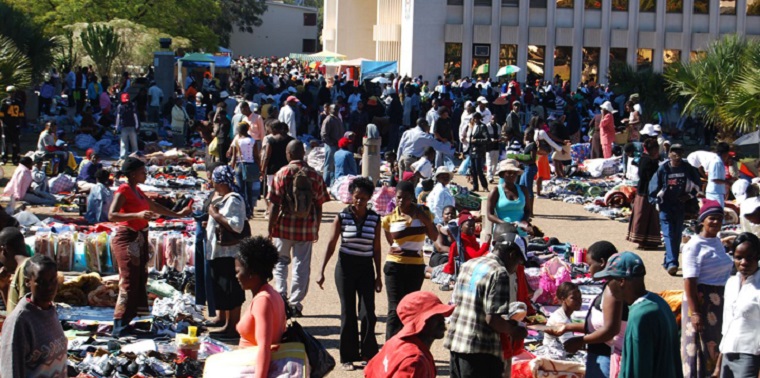By Amanda E Jojo
FINANCIAL Markets Indaba is set to co-host the Financing Climate Change Adaptation Investment Conference in March, The Entrepreneurial Magazine has learnt.
The finance sector presides over a large pool of capital which could be steered towards low carbon, climate resilient activities hence the Investment Conference will highlight the nexus between climate change and development in Zimbabwe.
Against this background, Financial Markets Indaba is going to co-host the conference with Business Weekly and it is going to be graced by Private Sector Executives, Investment Firms, NGO’s and Senior Government Officials. They are going to engage with delegates on policy and direction on climate change adaptation, the investment opportunities, efforts to reduce risk and cost of investment coupled with doing business in Zimbabwe.
In an interview with this publication, Managing Director of Financial Markets Indaba Patrick Muzondo said the goal of the Conference is to align both the private and public sectors to the United Nations Climate Change Conference of the Parties 26 (COP26) resolutions and agreements in order to attract local and international investment companies, firms and foreign businesses.
“Climate finance is needed for mitigation, because large-scale investments are required to significantly reduce emissions and it is equally important for adaptation, as significant financial resources are needed to adapt to the adverse effects and reduce the impacts of a changing climate.
“The COP26 meetings emphasised that all financial organisations must work to unleash the trillions in private finance that are needed to power us towards net zero by the middle of the century. Investors are increasingly recognising the threat posed by climate change to the global economy, and are looking to structure their action and develop consensus on best practice,” Muzondo said.
The United Nations Fact Sheet on Climate Change asserts that Africa is not a significant source of greenhouse gas emissions hence, Muzondo highlighted that Africa faces exponential collateral damage, posing systemic risks to its economies, infrastructure investments, water and food systems, public health, agriculture, and livelihoods.
He said: “Zimbabwe has been affected by climate change challenges which have led to an increasing frequency of severe droughts and cyclone induced floods with Tropical Cyclone Idai being one of the worst tropical cyclones on record to affect Africa.
“The developed rich nations have failed to meet their pledge to pay $100 billion a year by 2020 to poor countries although it is now expected to be reached by 2023 and more money has been promised, with COP26’s president, Alok Sharma, saying around $500 billion would be mobilized by 2025. However, this still falls far short of the $1.3 trillion that African negotiators wanted and what is estimated that the continent could face in climate change-related costs.”
The Zimbabwe government has committed to reducing emissions by 40 percent before 2030 and this includes investment in biomass, hydro energy and solar energy because sustainable investing embraces all those investments contributing to environmental and social issues.
“For the government, strong climate action offers many co-benefits in addition to delivering less carbon-intensive economies, and will very likely trigger investment opportunities.
“A shared understanding needs to be built between policy makers and the finance sector, based on a mutual recognition of the climate change challenge as well as an understanding of the finance and capital allocation decision-making process. This will help the finance industry and governments to work more closely together to mobilize private sector capital,” Muzondo declared.
He suggested some of the ways of attaining a new climate economy which include creating conditions for the rapid scale-up of renewables in the energy sector, scaling up sustainable food and land use systems, including forest landscape restoration and targeting investment to resilient water infrastructure.
Muzondo placed emphasis on the complimentary relationship between the energy and mining sector whereby clean energy transition will be significantly mineral intensive and the increasing demand for minerals and metals provides economic opportunities for resource-rich developing countries as well as private sector entities.
“The energy sector remains an important sector of investment and greater resilience to climate change impacts will be essential to the technical viability of the energy sector and its ability to cost-effectively meet the rising energy demands driven by economic and population growth.
“Accelerating the energy transition by tabling policies that deliver a rapid and efficient decarbonization of the energy sector. It is also important to address energy challenges in manufacturing, importing, and use of energy-efficient appliances, lighting and equipment,” he said.
For the mining sector, he projected a substantial increase in demand for several key minerals and metals that will lead to the manufacturing of cleaner energy technologies.
“The production of minerals, such as graphite, lithium and cobalt, could increase by nearly 500% by 2050, to meet the growing demand for clean energy technologies. Zimbabwe has a vast mineral resources potential with minerals that include lithium, graphite and cobalt which are used in components for electric vehicles, battery storage, renewable energy and technology,” he added.
In its paper titled “Understanding Poverty Agriculture and Food”, The World Bank states that transforming the agriculture sector and building resilience will not be possible without significantly increasing the amount of capital for climate-smart investments in agriculture.
“Climate-smart agriculture investments provide financial, community and environmental returns over both short-term and long-term horizons and deliver long-term positive impact.
“Investors, companies and farmers face evolving climate-related risks to production and stability of supply chains and have to transform to resilient global food systems. Food systems are the backbone of a healthy, equitable, and functioning society. As much as a quarter of global greenhouse gas emissions are from food systems,” he indicated.
He highlighted on the need to combine smart farming and food technology so as to boost agricultural output.
“The application of on-site solutions such as integrated soil and water management systems, water harvesting practices, conservation tillage, and integrated watershed and landscape planning can help increase productivity, raise system diversity and reduce farmer costs while reducing negative externalities,” he said.
Moreover, he underscored the significance of developing quality infrastructure that is resilient to climate change as it offers the continent considerable opportunities that ensure growth and development.
He stated that the defining characteristic of climate-resilient infrastructure is that it is planned, designed, built and operated in a way that anticipates, prepares for, and adapts to changing climate conditions.
He said:” Developing these plans provides an opportunity for decision makers to take a strategic view of how climate change will affect infrastructure needs in the coming decades and this will be achieved by assessing the impact of climate change on infrastructure with an outlook on infrastructure development and how operators and financiers will de-risk projects as well as infrastructure planning in light of sustainable urban management and the development of smart cities.”
Muzondo acknowledged the growing community of financial institutions that are taking steps to change corporate behaviour, influence policy outcomes and build the data, tools and transparency required to embed climate change.









